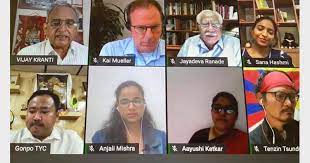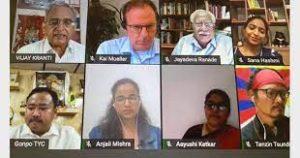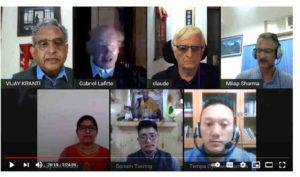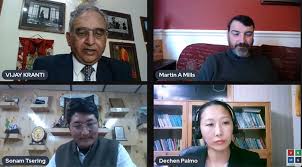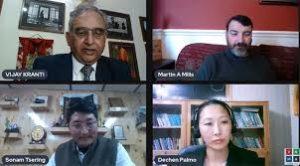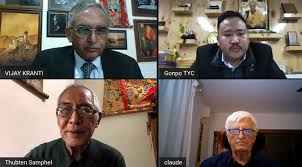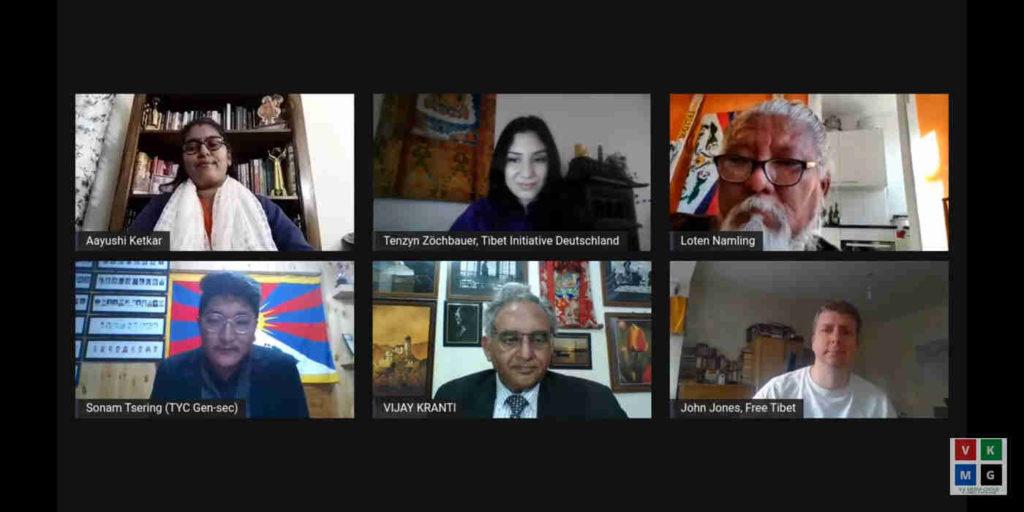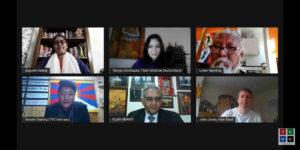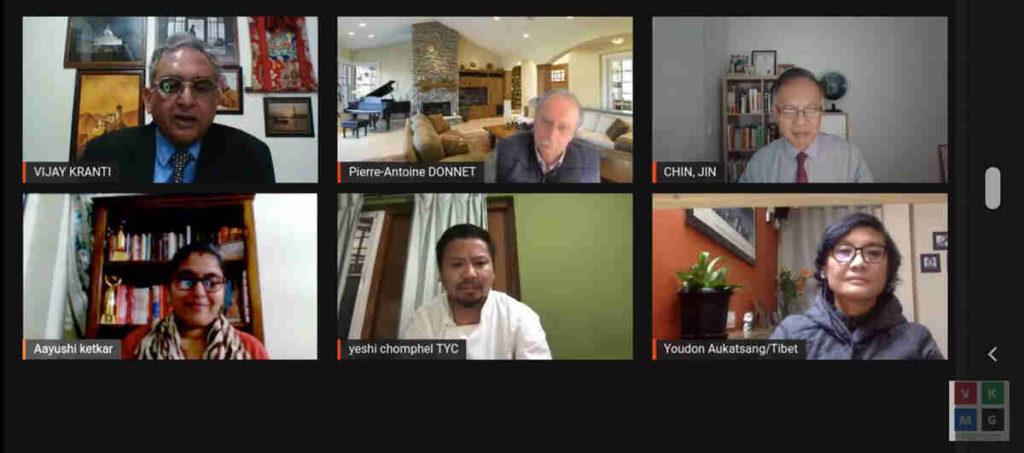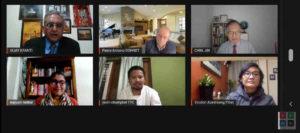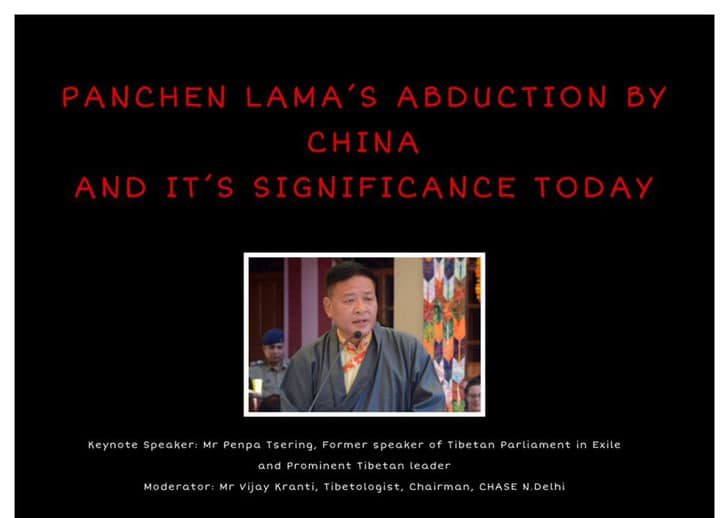
RELEASE OF PANCHEN LAMA AND POLITICAL PRISONERS WILL BE A TOP AGENDA OF THE NEW SIKYONG OF TIBET
Reports from New Delhi on webinar “Panchen Lama’s Abduction by China and its Significance”
-Vijay Kranti

New Delhi
25 April 2021: Mr.Penpa Tsering, the ‘Sikyong’ elect of Tibetan government-in-exile, has announced that he and Tibetan people will keep working tirelessly with governments, organizations and individuals around the world for the release of the Panchen Lama Gedhun Choekyi Nyima and all other political prisoners, held up in Tibet by China. Gedhun was arrested 26 years ago by China at the age of six in 1995 soon after the Dalai Lama had recognized him as the 11th incarnation of Panchen Lama. Since then China has refused to oblige various governments, human rights organizations and UN related bodies that have been demanding Beijing to give credible information about the where about and wellbeing of the boy. “We are not going to accept any interference of Chinese government in the religious matters of Tibetan people, especially in matters related to the reincarnation of present Dalai Lama,” he declared.
Mr. Penpa Tsering was delivering his maiden speech at a webinar on Sunday which was organized to mark the 32nd birthday of the Panchen Lama. Organizations like the Amnesty International and Human Rights Watch have declared Gedhun as the ‘youngest prisoner of conscience’ and have been running a frustrating international campaign for his release since 1995. Mr. Penpa, due to be formally announced as the next ‘Sikyong’, received winning votes in the just concluded elections for the executive head and members of the Parliament of the Tibetan diaspora through a secret ballot election which was held across six continents where Tibetan Diaspora lives. The post of ‘Sikyong’, Tibetan equivalent of President and Prime Minister of Central Tibet Administration has become important since 2011 when the Dalai Lama handed over his powers as the political head of Tibet to the elected representative of Tibetan people and the Parliament.
The webinar, entitled “Panchen Lama’s Abduction by China and It’s Significance” was jointly organized by Centre for Himalayan Asia Studies and Engagement (CHASE), Research & Development Foundation for Integral Humanism (RDFIH), Tibetan Youth Congress (TYC) and India chapter of Students for a Free Tibet (SFT). Other speakers included Mr. Bhuchung Tsering, President of International Campaign for Tibet (ICT) from Washington DC; Mr. Jaydev Ranade a prominent China expert and former Additional Secretary Cabinet Secretariat; Gompo Thondup, President TYC; Ms. Rinzin Choedon, National Director of SFT India and Ms. Dukthen Kyi, Head of Human Rights –European Union & United Nations Desk of CTA. Dr. Mahesh Sharma, Chairman RDFIH presided over the event and Mr. Vijay Kranti, a senior Tibetologist and Chairman CHASE moderated the discussion.
Mr. Penpa and all Tibetan speakers remembered the 10th Panchen Lama who had died under mysterious circumstances in January 1989 of, what Chinese government branded as ‘heart attack’, following his strong and public criticism of China’s human rights record in Tibet since China occupied it in 1951.
Going to the history of relations between the Dalai Lamas and Panchen Lamas since over past six centuries, Mr. Penpa said that they were like ‘Spiritual Father and Son’ to each other and the Tibetan people treated both of them as the sun and the moon in the sky. As per the Tibetan tradition Dalai Lama functions as the supreme spiritual and temporal leader of Tibet while Panchen Lama occupies second place in the religious hierarchy. Both of them functioned as the Guru or teacher to each other’s incarnation following death of one of them and both played important role in identifying the next incarnation of each other. –
Mr. Penpa said that while the Dalai Lama sought refuge in India in 1959, Panchen Lama decided to stay back. Underlining the patriotic Tibetan character of Panchen Lama he pointed out that “he was forced to undergo enormous inhuman torture, incarceration and humiliation for fifteen years for expressing his frank opinion about the sufferings of Tibetan people through his 70 thousand character long petition to the Chinese leaders. And even after his rehabilitation by Deng Xiao Ping and Hu Yaobang in 1980, the Panchen Lama remained committed to restoration of Tibetan culture and identity till the last day of his life in 1989. His brave acts proved that he was the most outspoken and courageous leader inside Tibet.”
Talking about the reasons behind arrest of the boy Panchen Lama and his parents, Mr. Penpa Tsering said one reason was that the Chinese did not like the idea that the Chinese appointed search-committee of Tibetan Lamas clandestinely took the step of acquiring exiled Dalai Lama’s recognition for the boy Panchen Lama. Secondly they were afraid that the Panchen Lama of Dalai Lama’s choice might be quietly taken to India and they would lose the political opportunity of using the Panchen Lama for recognizing the Dalai Lama’s next incarnation. Moreover they needed the physical presence of the Panchen Lama to add legitimacy to their choice of next Dalai Lama.
Mr. Penpa Tsering pointed out that first the Beijing government denied the abduction of Panchen ‘Rinpoche’ (a popular honorific for incarnate Lamas), but later accepted that he was under their custody. “Till this day they have denied every single request for access to the Panchen Lama by anyone including the United Nations Human Rights Commission. They have even refused to give any solid evidence about his physical safety or to prove that he is still alive. Even if he is alive, even then it is clear that he has been denied the real Buddhist education, thereby incapacitating him from fulfilling his religious responsibilities as Panchen Lama,” he said. –
“Recognition of a reincarnate Lama is purely a religious matter which is based on the philosophy of life after death. Therefore non-believers or any non-atheist person, especially the Chinese government, have no role to play in this process. Moreover Lamas undertake reincarnation on their own will to mitigate the sufferings of sentient beings and to continue the work of their previous life. They are not reborn to fulfil the whims of some political leaders,” asserted Mr. Penpa. “It is therefore not surprising that Tibetan people living inside Tibet have refused to accept Gyaltsen Norbu as the real Panchen Lama,” he added.
Introducing the subject Mr. Vijay Kranti, a renowned Tibetologist and Chairman CHASE, said that during first 40 years after occupation of Tibet between 1951 and 1991 the communist rulers of Tibet tried to destroy the religious and cultural identity of Tibet under the assumption that a Tibetan minus his or her faith in Buddhism and Dalai Lama will make a patriotic Chinese citizens. But when they discovered that even two generations after Dalai Lama had left Tibet, the Tibetan people’s faith in him, in Buddhism and their Tibetan identity remained as strong as ever. That is why they are now trying to occupy Tibet’s religious system from within. Forcibly installing fake Panchen Lama on Tibetan people or behaving desperate to occupy the institution of Dalai Lama through monopolizing the process of reincarnation only exposes the communist colonialist masters’ failure in winning hearts of the Tibetan people, he said.
Mr. Bhuchung Tsering called Beijing government’s step of appointing a handpicked five year old boy Gyaltsen Norbu as the 11th Panchen Lama as a farce and said that despite all efforts and influence of Chinese government, the people of Tibet have refused to accept Gyaltsen as the ‘Panchen Lama’. “In the eyes of the international community the forced disappearance of the boy Panchen Lama is an illegal act by all standards of international laws,” he said.
“The actions of a true Lama automatically establish his position and legitimacy in the hearts of people. The 10th Panchen Lama established his own position through his honest and brave stands during his life time. But Tibetan people’s refusal to accept the Chinese choice of Panchen Lama clearly shows that China cannot impose the legitimacy of its puppet Panchen Lama on any part of the hearts of Tibetan masses,” said Mr. Bhuchung who has played active role in promoting the case of Tibet among American law makers over past many years.
Mr. Jaidev Ranade, President Centre for China Analysis and Strategy (CCAS), who is known for his deep understanding of the Chinese political system and is a keen watcher of China’s role inside Tibet, said that abduction of a six year old child itself shows how much faith the Chinese rulers have in the people of Tibet or even in the legitimacy of their own claims about Panchen Lama. He said that the restrictions imposed on the free movement of their own appointed ‘Panchen Lama’ clearly shows that they are not confident about their own claims. “Beijing is desperately trying to establish Gyaltsen as a world Buddhist leader by organizing Buddhist conferences under its own World Buddhist Forum. It is also trying to occupy various Tibetan Buddhist lineages by appointing various ‘Tulkus’ (incarnate lamas or what Chinese call as ‘Living Buddhas’) in order to later appoint the next Dalai Lama of its own choice. But even Beijing’s own Tibet experts have been writing that it will be difficult for Chinese government to handle the situation raised by two rival Dalai Lama’s after the demise of present Dalai Lama,” said Mr. Ranade.
Mr. Ranade pointed towards Beijing’s recent campaigns to rewrite history of Tibet from Chinese colonial perspective and drew world’s attention towards imposing Mandarin in place of Tibetan language in Tibet Autonomous Region. “Chinese rulers are taking ridiculous steps like Sinicizing Tibetan Buddhism with socialist characteristics. They are even trying to teach the Tibetans that Buddhism came to Tibet from China, which Tibetans find laughable,” he pointed out.
Mr. Gonpo Dhundup, President TYC said, “First the Chinese killed the 10th Panchen Lama by poisoning him just because he dared to openly challenge and criticize China’s role in Tibet. Now they are trying to impose a puppet Panchen Lama and his ‘reincarnation’ on the people of Tibet. That is the reason why Tibetan people inside Tibet have refused to accept him.”
Referring to the havoc and destruction caused by what he termed as the ‘Chinese virus’ across the world, Mr. Gonpo called upon the world community to make China accountable for it and demand compensation for all the loss it has caused to countries, businesses and people across the globe. He said today’s Tibetan youths draw inspiration from brave leaders like the late 10th Panchen Lama, who showed the courage to challenge the mighty government of China, and will keep working towards regaining independence of Tibet from the Chinese colonial rule.
Expressing the resolve of Tibetan Youth Congress Mr. GonSpo announced that “Our movement for the independence of Tibet will continue till our goal is reached. Our campaign for the release of Panchen Lama and all political prisoners in Tibet is going to gain momentum in near future.”
Referring to Beijing government’s claims that it is denying outsiders’ access to Gedhun Choekyi Nyima for his own protection from the ‘splittist’ forces, Ms. Richen Choedon of SFT India said that such a lame argument sounds bizarre and a challenge to the wisdom of rest of world. She said that Tibetan people strongly condemn and oppose the so called law ‘Order-5’, issued by Chinese government in 2007 which claims that the Chinese Communist Party has exclusive right on identifying incarnations of Tibetan Tulkus, especially the Dalai Lama. “More the Chinese rulers make noise and claims on right to install the next Dalai Lama, more the people of Tibet lose their faith in them,” she said.
Praising American President’s statement about sending greetings to the 11th Panchen Lama on his 32nd birthday, Ms. Rinzin called upon the government of India take a strong and clear stand on the issue of reincarnation of Dalai Lama. She urged the youths of India to take lead in supporting Tibet because free Tibet is guarantee to India’s security from China.
Ms. Dukthan Kyi, who heads the Human Rights, UN and European Union desk at CTA in Dharamshala, spoke with special focus on attempts going on in various UN forums and other international platforms for the release of Panchen Lama over past 26 years. She said many leading international human rights organizations are shocked to note that whenever the issue of Panchen Lama’s disappearance is raised on any UN forum the Chinese officials use China’s special powers and privileges to kill the initiative. “A ridiculous situation arose in 1998 when Chinese government refused to give any cooperation to the UN Human Rights Commission on its visit to Tibet. In 2002 and 2007 also they deflected the attempts of the HR Commission by claiming that Gedhun was safe and that his parents did not want any outside interference in his life”, she informed the audience.
“And the worst experience was when Tibetan and many international child rights groups sought the UN intervention in boy Panchen Lama’s case under the UN Convention on the Rights of the Child. The Ambassador of China at the UN claimed that the child was under the protection of Chinese government so no access to outsiders can be given in order to protect him from abduction,” said Ms. Dukthen.
“But today when Gedhun is no more a child and he is a grown up man then why does he need protection of the Chinese government? Why China is afraid of even releasing his photos to the world community or why the representatives of UN or human rights groups are not allowed to have access to him?” she asked.
In his Presidential address Dr. Mahesh Chandra Sharma, Chairman RDFIH and a leading scholar of Integral Humanism, said that the issue of Tibet is not merely an issue of human rights. Looking at Tibetan issue from modern day’s geo-political perspective too amounts to reducing its seriousness. The issue of Tibet is actually a case of deliberate destruction of a geo-cultural and a national identity. A free nation with millenniums old identity and rich cultural heritage has been colonized and its Buddhist identity is being blatantly destroyed by a colonial power. This must be challenged.
“It looks funny that on the one hand the colonial masters of Tibet try to arrest or kill the Panchen Lama and Dalai Lama. But the same colonial masters are today desperately wanting to own both of them to establish their own legitimacy over Tibet?” asked Dr. Sharma.

